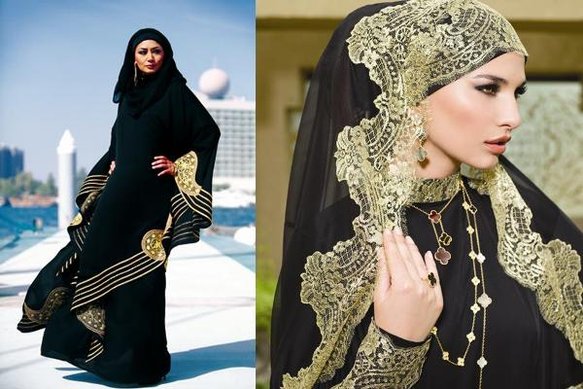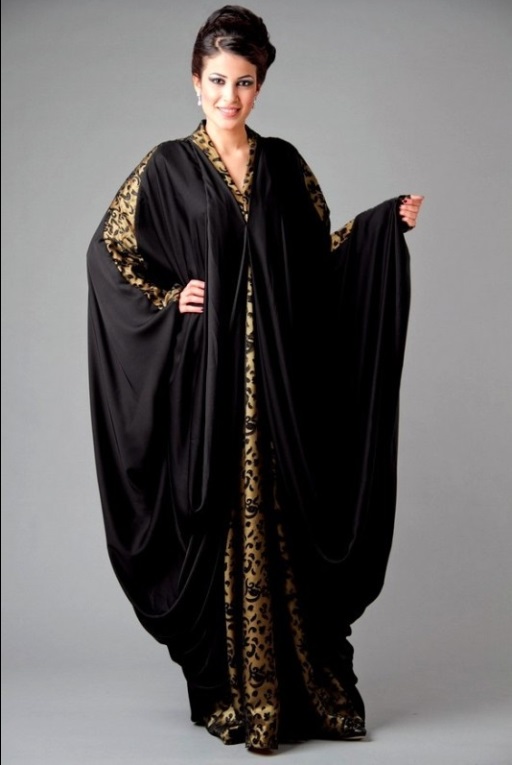Embroidered clothes in the Middle East
.png)
Being an ancient art of beauty and elegance, embroidery is traditional for many countries in the Middle East. It strikes by the wealth, variety of patterns and techniques, because it is the supreme quality art.
Traditional embroidery in the UAE
The UAE traditionally used to decorate clothes, headwear-veils, as well as wall tapestries with exceptional and amazing embroidery resembling a light lace at first glance.
With the help of embroidered patterns, Arab women try to emphasize their charm, tenderness and sometimes even show the husband’s social status. People in the UAE used to embroider clothes with golden threads adding tints of silver or copper.
The multi-colored dresses made from a thin silk and generously adorned with charming patterns featuring mysterious motives look extremely exquisite and elegant. At first sight, it seems that an unusual fairy creature put into fabric smiles and sometimes frightens us with its wide-open mouth. In fact, Arabic women’s dresses are embroidered with gorgeous trees, flower leaves and rare plants attracting attention by fanciful interweaving of branches.
As a rule, traditional Arab dresses have three segments of an embroidered pattern: on the chest, on the hem and sleeves. The central element of the embroidered dress is highly connotative. It can be the tree of life with an obligatory image of the Sun or flower in full blossom at the top. It symbolizes life with joy and rosy prospects.
Traditional embroidered bedspreads, which contain excerpts from the Koran or the quotations of the Prophet Muhammad, are also a part of the culture of the United Arab Emirates. The golden letters of the Arab interwoven ornament on a black background of silk fabrics look mysterious, elegant and very expensive. Undoubtedly, this adds value both to the product and to the words of the wise Prophet.
Embroidered things in Qatar

Qatar is appropriately called the Pearl of the Persian Gulf. This is a very interesting country that attracts tourists both by the beauty of the landscapes and by cultural traditions, one of which is embroidery. Qatari men and women’s national costume is impossible without an embroidered adornment. Sewing with golden and silver threads on a red or black fabric is also called tatriz and is considered the oldest craft in this region.
Tatriz is not just threads and fabric, but a national perception of the world, a kind of philosophy of life of contemporary residents of the Arabian Peninsula.
By looking for an amazing mixture of patterns and arabesques, a skillful combination of vegetable and geometrical ornaments, we think that the image is created by a higher power, rather than by skillful hands of craftswomen. Tatriz is characterized by a specific extended central part that resembles the letters from the Koran and framed with flowers that symbolize the bounties of human life.
Despite the fact that in everyday life Qatari women dress quite modestly, during the holidays their clothes seem to shine with precious stones and extraordinary embroidered patterns.
Qatari embroidery culture allows using beads, rhinestones, small precious stones that adds an amazing elegance and significance to the costume.
Saudi Arabia – the country of the traditional embroidery

It is incredible, but predominantly men are engaged in embroidery in Saudi Arabia. First, they carefully and artfully apply the quotations from the Koran with the paint on prepared fabric, and then embroidery the necessary letters with golden threads using specific wooden motion guides. Each mosque is decorated with embroidered paintings with religious fragments made with extraordinary diligence and love.
Arab women’s dresses fascinate from the first sight. Black dresses belonging to traditional clothes of Saudi Arabia virgins is decorated with blue, red and yellow patterns embroidered not only to decorate clothes, but rather to emphasize a sacred destination of a woman – to give birth to a healthy child who will continue the family line. The symbolic characters carefully put into the fabric by skillful hands of craftsmen prove it.
One can say with confidence that the history of the development of the Middle East is a unique region that is a kind of bridge connecting three continents, has become a source of different religions and cultures, interwoven into the fabric of our civilization. The history of embroidery in the region also reflects the unprecedented experience and richness of ancient nations who inhabited this territory previously. That’s why embroidery is a truly universal thing. However, it is somewhat modified in each country, enriched with the spirit of the nation, its traits, traditions and customs. Each embroidery is beautiful, unusual and symbolic its own way.
Being an ancient art of beauty and elegance, embroidery is traditional for many countries in the Middle East. It strikes by the wealth, variety of patterns and techniques, because it is the supreme quality art.
Traditional embroidery in the UAE
The UAE traditionally used to decorate clothes, headwear-veils, as well as wall tapestries with exceptional and amazing embroidery resembling a light lace at first glance.
With the help of embroidered patterns, Arab women try to emphasize their charm, tenderness and sometimes even show the husband’s social status. People in the UAE used to embroider clothes with golden threads adding tints of silver or copper.
The multi-colored dresses made from a thin silk and generously adorned with charming patterns featuring mysterious motives look extremely exquisite and elegant. At first sight, it seems that an unusual fairy creature put into fabric smiles and sometimes frightens us with its wide-open mouth. In fact, Arabic women’s dresses are embroidered with gorgeous trees, flower leaves and rare plants attracting attention by fanciful interweaving of branches.
As a rule, traditional Arab dresses have three segments of an embroidered pattern: on the chest, on the hem and sleeves. The central element of the embroidered dress is highly connotative. It can be the tree of life with an obligatory image of the Sun or flower in full blossom at the top. It symbolizes life with joy and rosy prospects.
Traditional embroidered bedspreads, which contain excerpts from the Koran or the quotations of the Prophet Muhammad, are also a part of the culture of the United Arab Emirates. The golden letters of the Arab interwoven ornament on a black background of silk fabrics look mysterious, elegant and very expensive. Undoubtedly, this adds value both to the product and to the words of the wise Prophet.
Embroidered things in Qatar

Qatar is appropriately called the Pearl of the Persian Gulf. This is a very interesting country that attracts tourists both by the beauty of the landscapes and by cultural traditions, one of which is embroidery. Qatari men and women’s national costume is impossible without an embroidered adornment. Sewing with golden and silver threads on a red or black fabric is also called tatriz and is considered the oldest craft in this region.
Tatriz is not just threads and fabric, but a national perception of the world, a kind of philosophy of life of contemporary residents of the Arabian Peninsula.
By looking for an amazing mixture of patterns and arabesques, a skillful combination of vegetable and geometrical ornaments, we think that the image is created by a higher power, rather than by skillful hands of craftswomen. Tatriz is characterized by a specific extended central part that resembles the letters from the Koran and framed with flowers that symbolize the bounties of human life.
Despite the fact that in everyday life Qatari women dress quite modestly, during the holidays their clothes seem to shine with precious stones and extraordinary embroidered patterns.
Qatari embroidery culture allows using beads, rhinestones, small precious stones that adds an amazing elegance and significance to the costume.
Saudi Arabia – the country of the traditional embroidery

It is incredible, but predominantly men are engaged in embroidery in Saudi Arabia. First, they carefully and artfully apply the quotations from the Koran with the paint on prepared fabric, and then embroidery the necessary letters with golden threads using specific wooden motion guides. Each mosque is decorated with embroidered paintings with religious fragments made with extraordinary diligence and love.
Arab women’s dresses fascinate from the first sight. Black dresses belonging to traditional clothes of Saudi Arabia virgins is decorated with blue, red and yellow patterns embroidered not only to decorate clothes, but rather to emphasize a sacred destination of a woman – to give birth to a healthy child who will continue the family line. The symbolic characters carefully put into the fabric by skillful hands of craftsmen prove it.
One can say with confidence that the history of the development of the Middle East is a unique region that is a kind of bridge connecting three continents, has become a source of different religions and cultures, interwoven into the fabric of our civilization. The history of embroidery in the region also reflects the unprecedented experience and richness of ancient nations who inhabited this territory previously. That’s why embroidery is a truly universal thing. However, it is somewhat modified in each country, enriched with the spirit of the nation, its traits, traditions and customs. Each embroidery is beautiful, unusual and symbolic its own way.

Comments
No comment at this time!
Leave your comment